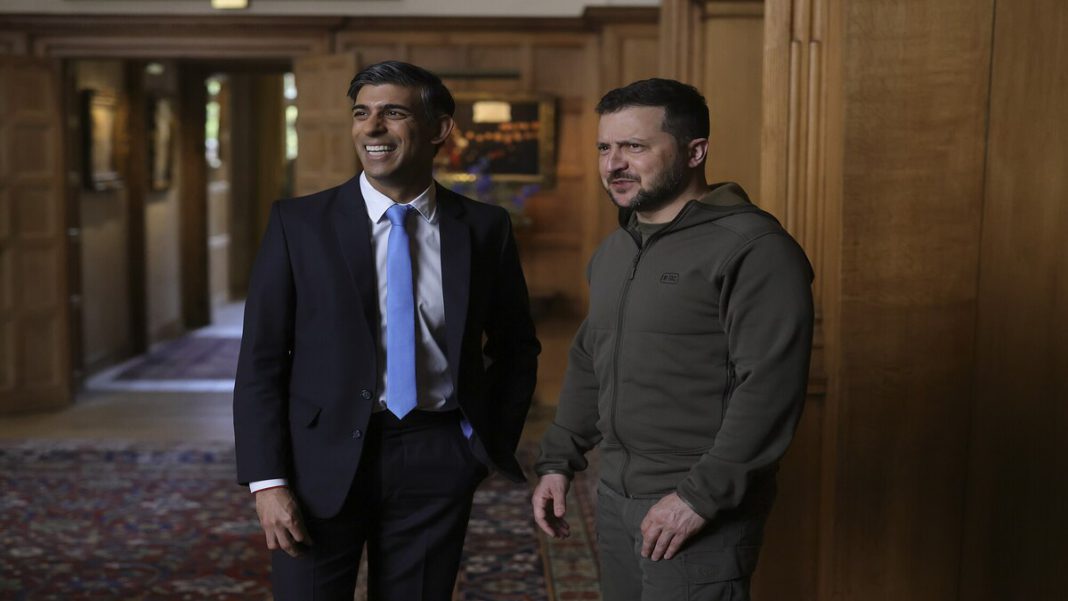UKRAINE: Ukraine’s economy will require external assistance for many years to come, said a Senior World Bank Official. Anna Bjerde stated the war-torn nation “also has a lot of potential to turn a lot of its assets into economic opportunity and recovery”.
The managing director for operations was speaking in front of a significant international gathering in London on reconstructing the Ukrainian economy. Last year, the nation’s economy dropped by 29%, falling to just over $140 billion (£109 billion).
At the Ukraine Recovery Conference, which is emphasising the contribution the private sector can make to the nation’s reconstruction, the World Bank and other multilateral development organisations are playing a key role.
In March, the cost of rehabilitation as a whole was anticipated to be $411 billion, but it is now expected to be higher due to ongoing hostilities with Russia.
The meeting will open with remarks from the co-hosts, Ukrainian President Volodymyr Zelensky and UK Prime Minister Rishi Sunak.
Sunak is set to announce $3 billion in World Bank loan guarantees and is going to tell the delegates that, “As we’ve seen in Bakhmut and Mariupol, what Russia cannot take, it will seek to destroy. They want to do the same to Ukraine’s economy.”
“President Zelensky’s government is determined to drive reforms to become more open, more transparent, and ready for investment.” In the immediate term, Ukraine needs $14 billion from foreign donors to get through this year.
Bjerde said that this money will be used for “essential social expenditures” like pension payments, medical care, and salaries for teachers and doctors. It will also assist in financing the urgent maintenance required for infrastructure, including roads and the electrical grid, which is essential for the ailing economy to function.
Despite the hardships that many economies around the world are experiencing as a result of the conflict in Ukraine, Bjerde is optimistic that the funding will come in. “I think there’s been a huge level of commitment shown to Ukraine, and I think that will continue. Ukraine is just too important,” she said.
She says that the billions of dollars that have already been poured have “helped arrest what otherwise would have been even more devastating humanitarian impacts on the country”, adding that Ukraine will also need to assist itself.
That may prove challenging given that agriculture is a significant source of income for Ukraine. It is a significant global supply of crops like corn, wheat, and sunflower.
Despite a pact to ease certain exports, which is due to expire the following month, output is predicted to drop from 53 million metric tonnes in 2022 to about 45 million metric tonnes in 2019. Some of it is due to damaged infrastructure, which makes it more difficult to export commodities from Ukraine.
These issues were highlighted in a poll conducted by the American Chamber of Commerce in Ukraine (AmCham Ukraine). It reveals that 49% of businesses have experienced building damage.
Additionally, it was shown that during the 15 months of the war, 32% of enterprises experienced employee fatalities and 27% staff injuries.
Nevertheless, it was also discovered that 74% of businesses wanted to hire Ukrainians for existing projects, and 63% planned to invest in new projects, factories, or infrastructure.
Andy Hunder, the president of AmCham Ukraine, mentioned a few of the topics that would be covered during the conference in London.
The majority of firms in Ukraine “don’t plan to make claims for war damages until proper and clear compensation mechanisms are developed and eventually implemented,” he said.
The two-day gathering of political and business leaders will also examine if a war insurance programme can be implemented to stimulate some of the private sector investment that the World Bank claims is essential for reviving the economy.
According to a separate survey, businesses have witnessed a 53% average decline in revenue since 2021, before the war. It was reported that bigger businesses have experienced more disruption than smaller ones.
While major corporations like Coca-Cola, Mondelez, and Unilever have had their facilities damaged, others have already begun investing in Ukraine’s rebuilding.
For it to continue, according to Hunder, “comprehensive war risk insurance for investors has a key role to play in securing investment in Ukraine’s rebuilding and recovery.”
Blackrock and JP Morgan are assisting the Ukrainian government in securing private sector funding for reconstruction. According to Bjerde of the World Bank, this will be crucial for generating the jobs and innovation that will fuel Ukraine’s revival.
“Even if the war were to end today, there will be an adjustment period; the economy has changed a lot. Poverty in Ukraine has gone up, and the dynamics and demographics have changed. So there will need to be support for the time to come,” she continued.
Also Read: Vladimir Putin Refutes Crucial Elements of African Peace Plan for Ukraine



